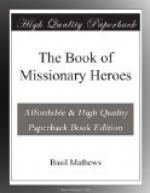The reef, covered at mid-tide with curling waters mottled with the foam of the broken waves, was alive with men; while the beach beyond was black with crowds of the wild islanders who had come down to see the strange visitors from the ship. The four men sculled the boat on to the edge of the reef and then rested on their oars as Patteson swung himself over the side into the cool water. He waded across the reef between the hosts of savages, and in every hand was a club or spear or a six-foot wooden bow with an arrow ready to notch in its bamboo string.
Patteson had come to make friends with them. So he entered a dark wattled house and sat down to talk. The doorway was filled with the faces of wondering men. As he looked on them a strange gleam of longing came into his eyes and a smile of great tenderness softened the strength of his brown face—the longing and the tenderness of a shepherd looking for wandering sheep who are lost on the wild mountains of the world.
Then he rose, left the house, and went back to the boat. The water was now one seething cauldron of men—walking, splashing, swimming. Some, as Patteson climbed into his boat, caught hold of the gunwale and could hardly be made to loosen their hold. The four young fellows in the boat swung their oars and got her under way, but they had made barely half a dozen strokes when, without warning, an arrow whizzed through the air into the boat. A cloud of arrows followed.
Six canoes were now filled with savage Santa Cruzans, who surrounded the boat and joined in the shooting. Patteson, who was in the stern between his boys and the bowmen, had not shipped the rudder, so he held it up, as the boat shot ahead of the canoes, to shield off arrows.
Turning round to see whither his now rudderless boat was being pulled, he saw that they were heading for a little bay in the reef, which would have wrecked their hopes of safety.
“Pull, port oars, pull on steadily,” shouted Patteson; and they made for The Southern Cross.
As he called to them he saw Pearce, the young British sailor, lying between the thwarts with the long shaft of an arrow in his chest, and a young Norfolk Islander with an arrow under his left eye. The arrows flew around them in clouds, and suddenly Fisher Young—the nineteen-year-old Polynesian whom he loved as a son—who was pulling stroke, gave a faint scream. He was shot through the left wrist.
“Look out, sir! close to you,” cried one of his crew. But the arrows were all around him. All the way to the schooner the canoes skimmed over the water chasing the boat. The four youths, including the wounded, pulled on bravely and steadily. At last they reached the ship and climbed on board, while the canoes—fearing vengeance from the men on the schooner—turned and fled.
Once aboard, Bishop Patteson knelt by the side of Pearce, drew out the arrow which had run more than five inches deep into his chest, and bound up his wound. Turning to Fisher, he found that the arrow had gone through the wrist and had broken off in the wound. Taking hold of the point of the arrow where it stood out on the lower side of the wrist, Patteson pulled it through, though the agony of the boy was very great.




